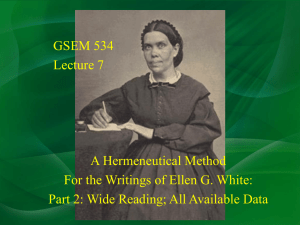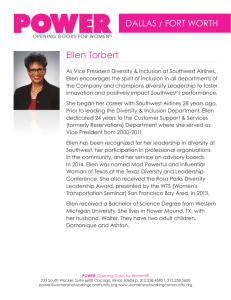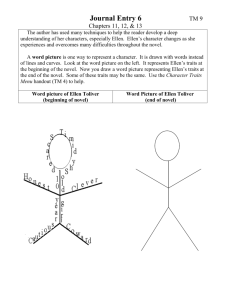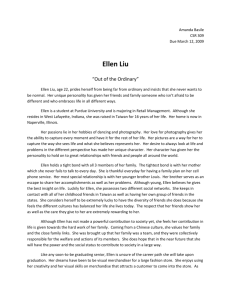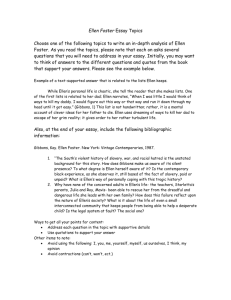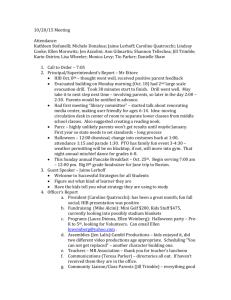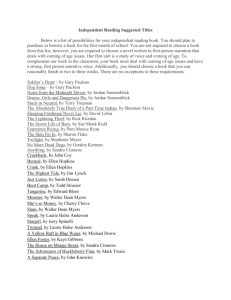Ellen G. White - Andrews University
advertisement
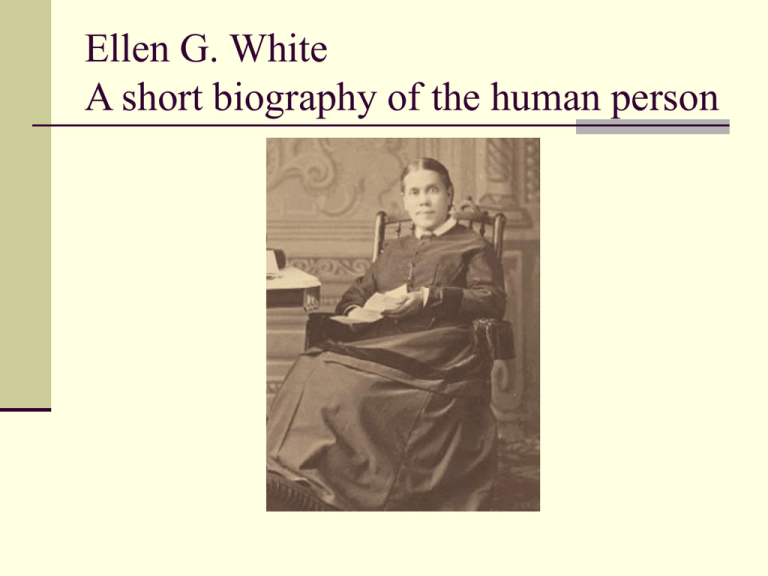
Ellen G. White A short biography of the human person The Harmon family Father: Robert F. Harmon, Sr. [1786-1866] Mother: Eunice Gould Harmon [1787-1863] The Harmon family Caroline Harmon- Clough (18121883) Married to a Methodist clergyman Niece: Mary Clough The Harmon family Harriet Harmon McCann (1814-1870s) Wife of a clergyman in Kansas. John B. Harmon (1815-1883) Businessman in Illinois The Harmon family Mary Plummer Harmon Foss (1823- 1912) Married Hazen Foss' brother, Samuel Foss Sarah Harmon-Belden (1822-1868) Married Stephen Belden in Aug 1851 Two children: Franklin and Lillian The Harmon family Robert F. Harmon, Jr. (1825-1853) Only brother to become Sabbatarian Adventist The Harmon family Elizabeth ("Lizzie") N. Harmon Bangs (18271891) Ellen's fraternal twin Married Reuben Bangs Never accepted Ellen's gift African Ancestry? Some people have claimed that Ellen White has African American ancestry on the Gould side of her family. Supporting this claim is her facial features and research done by Elder C. E. Dudley After some thorough research done regarding this claim, to the best of our knowledge we do not have any tangible proof of this and, as far as we can tell, her ancestry is only European Caucasian. African Ancestry? The latest summary of the claims and research can be found in: Craig Newborn, article: “Ancestry of Ellen G. White” in the Ellen G. White Encyclopedia (Review and Herald). James R. Nix, “Ellen White’s racial background” in “Ellen White and Current Issues” Symposium, Center for Adventist Research, Andrews University, volume 1 (April 4, 2005), pp. 30-45. “My misfortune” At age nine, Ellen Harmon suffered a tragic accident which, she later wrote, "was to affect my whole life" (LS 17). She was struck on the nose by a stone hurled by a classmate angry at some childish trifle. She was in a coma three weeks. "I was reduced almost to a skeleton." (LS 18) “My misfortune” Ellen was also physically disfigured for the rest of her life. "Every feature of my face seemed changed. The sight was more than I could bear. The bone of my nose proved to be broken. The idea of carrying my misfortune through life was insupportable. I could see no pleasure in my life. I did not wish to live, and I dared not die, for I was not prepared." (2SG 9) The Aftermath of the Accident Ellen Harmon never resumed formal schooling. Some 50 years after the accident, she wrote that that "which for a time seemed so bitter and was so hard to bear, have proved to be a blessing in disguise. The cruel blow which blighted the joys of earth, was the means of turning my eyes to heaven. I might never have known Jesus, had not the sorrow that clouded my early years led me to seek comfort in Him" (RH, Nov. 25, 1884; cited in 1Bio 30-31). James White Born Aug. 4, 1821, at Palmyra, NY 5th of nine children Suffered from poor eyesight which kept him out of school until the age of 19 Formal education consisted of a total of 29 weeks James White’s religious experience Baptized into the "Christian Connection" denomination Profoundly moved by the preaching of William Miller and in September 1842 He was successful in preaching the Millerite message: in the winter of 1842-43 Ordained to the gospel ministry in April 1843 Courtship They met prior to 1844, at Portland, Maine Became acquainted on a trip to Orrington, Maine, where they both went to combat fanaticism. A courtship developed, but was allowed to mature only after both had assured themselves that the relationship had God's approval. Marriage The ceremony was performed by a justice of the peace, in Portland, Maine, Aug. 30, 1846. James was 25 years, 1 month old Ellen was 18 years, 9 months old. A problem with timidity May be as a residual effect from her accident (which physically scarred her for life). At age 17, she was commissioned to public ministry. Her reaction: "I was exceedingly troubled. . . . My heart shrank in terror from the thought" (LS 69-70). Reasons why: (1) Poor health (2) "I was only seventeen years of age, small and frail” (3) "I was young and timid” Acute privation in their home In the earliest days of their married life, they lived in the homes of others Harmon home Stockbridge Howland home They started housekeeping with borrowed furniture, but determined to be financially independent. Acute privation in their home In vision Ellen was "shown that the Lord had been trying us for our good, and to prepare us to labor for others; that He had been stirring up our nest, lest we should settle down at ease. Our work was to labor for souls; if we had been prospered, home would be so pleasant that we would be unwilling to leave it; trials had been permitted to come upon us to prepare us for the still greater conflicts that we would meet in our travels" (LS 105-106). Nursing an invalid husband James White was never in robust health. Stricken with paralysis on Aug. 16, 1865. Hospitalized at "Our Home on the Hillside," a health reform institution operated by Dr. Jackson, at Dansville, New York. God instructed Ellen White to remove her husband from this hospital. Nursing an invalid husband On Christmas Day, 1865, Mrs. White received a vision during a prayer session in which she was shown that Adventists had not done enough to promote health reform, and should establish a health institution: (a) To promote proper cures for healing those already ill. (b) To teach prevention of illness through proper diet and other reforms. Although James White recovered from this stroke, he would experience about five strokes before his death 16 years later, in 1881, at the age of 60 (LS 248-249). Nursing an invalid husband To hasten his convalescence they sold their home in Battle Creek, and relocated on a small farm purchased at Greenville, Michigan. James White was most reluctant to engage in any exercise, because he had been converted to Dr. Jackson's erroneous theory of total mental and physical inaction in the recovery of health. In the spring and summer of 1867, slowly James began to show an interest, and join in the garden work in a limited way. Nursing an invalid husband Although James White recovered from this first stroke, he experienced altogether about five strokes before his death 16 years later, in 1881, at the age of 60 (LS 248-249). Rejection by the Battle Creek Church By March, 1867, after an extended absence from Battle Creek, Ellen White began to receive letters in Greenville "of a discouraging character" from some of the members of the Battle Creek church. "Grieved in spirit beyond measure, I remained at home, dreading to go anywhere among the church for fear of being wounded. Finally, as no one made an effort to relieve my feelings, I felt it to be my duty to call together a number of experienced brethren and sisters, and meet the [false] reports which were circulating in regard to us. Weighed down and depressed, even to anguish, I met the charges against me. . ." (1T 580-581). Interpersonal problems Interpersonal problems between James and Ellen over differences of opinion concerning the handling of their son, Edson. James took a very stern, "tough love," attitude, refusing to bail Edson out from the consequences of his spendthrift ways. Ellen, however, took a more tender, lenient, conciliatory attitude, which caused James to disagree and, at times, explode. Interpersonal problems Problems caused by the deterioration of James’ condition. James eventually experienced a complete change of character and personality. "I shall use the old head God gave me until He reveals that I am wrong. Your head won't fit on my shoulders. Keep it where it belongs, and I will try to honor God in using my own. I shall be glad to hear from you, but don't waste your precious time and strength in lecturing me on matters of mere opinion" (Letter 66, May 16, 1876). Widowhood and loneliness James died on Aug. 6, 1881, at age 60. They had been married for 35 years. "His sympathy and prayers and tears I have missed so much, so very much. No one can understand this as myself. But my work has to be done" (Ms 227, 1902, cited in 3SM 67). "I miss Father more and more. Especially do I feel his loss while here in the mountains. I find it a very different thing being in the mountains with my husband and in the mountains without him. I am fully of the opinion that my life was so entwined or interwoven with my husband's that it is about impossible for me to be of any great account without him" (Letter 17, Sept. 12, 1881). Remarriage? "Since twenty-one years ago, when I was deprived of my husband by death, I have not had the slightest idea of ever marrying again. Why? Not because God forbade it. No. But to stand alone was best for me, that no one should suffer with me in carrying forward my work entrusted to me of God. And no one should have a right to influence me in any way in reference to my responsibility and my work in bearing my testimony of encouragement and reproof." (Ms. 227, 1902; cited in 3SM 66, 67) Mother of four sons Henry Nichols White (1847-1863) Spent many of his early years with the Stockbridge Howland family. “Sweet singer” Died prematurely at 16 years of age, of pneumonia. Mother of four sons James Edson White (1849- 1928) Known by his middle name (to differentiate him from his father) Missionary to former African American slaves in the southern United States (often at great personal endangerment, from violence at the hands of angry plantation-owners). Mother of four sons William Clarence White (1854-1937) Known affectionately as "Willie" After his father's decease he served as counselor, business manger, and traveling companion to his mother, a task to which God had especially called him. Mother of four sons Mother of four sons John Herbert White (1860) Died at age 2 ½ months, from erysipelas (also known medically as "St. Anthony's Fire"). The human person She had her own struggles, weaknesses, strengths, and difficulties Battled disease and illnesses Lived in poverty The human person Worked hard at raising a family and serving the church Had her shortcomings Suffered the loss of a husband and two sons
